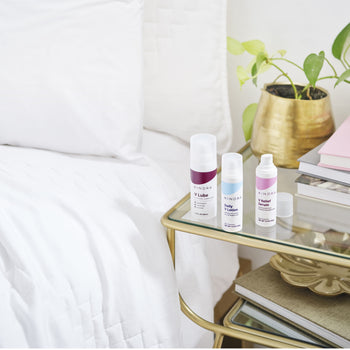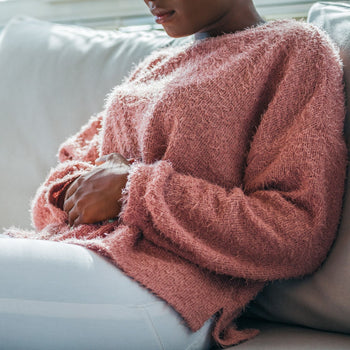Most of us think of summer as a time for travel, outdoor adventure, and relaxation. But for menopausal women, it can also be a season of flushed, overheated discomfort—and one that is completely unpredictable.
Fortunately, we can take steps to reduce the intensity of our hot flashes, and the sooner you take action, the sooner you’re likely to find some relief. Here, we’ve tackled a few of the most common queries about menopause and body temperature. If you have more burning questions, sound off in Kindra’s private Facebook group, where you’ll find a community navigating menopause together by sharing stories, advice, and more.
Hot flashes are bad enough year-round, but summer is especially tough. It’s frustrating as I’m finally leaving my house and being social after so long. Any tips?
Much of the conventional wisdom around beating the heat can be applied to menopause, too. Dress in light, breathable layers. And of course, turn up the AC indoors or look for shaded areas outside.
But don't wait around to call reinforcements, either. Taking a body-balancing daily supplement, such as The Core, can drastically reduce the frequency and severity of your hot flashes (as well as promote mental clarity and soft, supple skin). These game-changing capsules deliver the best results when used consistently over time. Check in with your body and adjust your habits now, and you'll be well on your way to relief in just a matter of weeks.
I’ve read tips online about evening primrose oil, black cohosh, Pycnogenol, and other natural remedies for hot flashes. Which options should I consider, and how long should I use them to notice a difference?
There are many well-known natural solutions to help manage hot flashes. Evening primrose oil, for example, can reduce issues with body temperature regulation, especially when taken orally. And Vitamin B-6—something you likely already consume regularly with leafy greens, fish, poultry, and beans—can boost serotonin and alleviate symptoms by interacting with your estrogen production.
French maritime pine bark extract, or Pycnogenol, is an especially strong antidote. A primary ingredient in The Core as well as Kindra's energy-boosting and sleep-enhancing supplements, Pycnogenol improves sleep and reduces hot flashes, night sweats, and brain fog. And while other herbs like black cohosh can be tough on your liver and may emulate estrogen with soy isoflavones, Pycnogenol has been shown not to alter hormones in menopausal women. The superhero antioxidant usually has a noticeable effect within about a month, so start a daily regimen now to reap the rewards before summer's end.
I am 60 and still experiencing hot flashes—even after going through menopause at 53. Is it normal for them to last this long?
One of the most frustrating things about hot flashes is their unpredictable nature. The median duration of hot flashes (aka vasomotor symptoms) in a large study was found to be about 7.5 years from the onset. In most cases, hot flashes begin sporadically during perimenopause, peak during menopause itself, and taper off afterward. But “afterward” isn’t a firm timeline: For several years after menopause (yes, sometimes up to a decade or more), you may continue to experience hot flashes, though in most cases they will decline in frequency and severity.
For medical reasons, I’m unable to use hormone replacement therapy (HRT). What else can I do to relieve my hot flashes and horrible night sweats?
There are a lot of reasons that women may not be able to use hormone replacement therapy for hot flashes. The majority of the time, it is because they may be more vulnerable to the negative side effects from estrogen. This may include a personal or familial risk of breast cancer, and/or a higher risk of blood clots, or stroke, just to name a few. There are also those who like the idea of using something that is sourced in nature, rather than in a lab, because it feels less harmful
Answering the “natural and safe” part of the question is kind of tricky. There are plenty of supplements available in the marketplace that do not contain estrogen to help with hot flashes.
The trick is to find a supplement that does not A) indirectly stimulate estrogen receptors and/or B) form estrogen precursors to obtain its results. If estrogen is not your challenge, then you need to be careful that the other ingredients don’t inadvertently cause your blood pressure to rise or fall, damage your liver or cause other side effects. Part of the challenge here is finding studies and labelling that can help guide women or their healthcare providers to make informed decisions about these products.
Another part of the challenge is that supplements are not subjected to the scrutiny of the FDA, and so for all supplements, it is important to find a brand that makes sure that they do their own quality testing. Lastly there are plenty of non-FDA approved hormonal supplements commercially available that have been touted as “natural”. To be clear, there is no natural source of estrogen (i.e., no plant source). Therefore those supplements that are touted as “bio-identical” use many of the same chemicals and processes that prescription medications do, without the benefit of monitoring the process and ingredients for safety that FDA approved medications have.
This does not mean that there aren’t any options for you. First, there are a few non-hormonal FDA approved therapies that can help with hot flashes and night sweats, so be sure to discuss this with a healthcare provider if any of these are right for you. There are also FDA approved therapies that selectively target some estrogen receptors but not others, so can be safer than taking “regular” estrogen.
There are also supplements that can help that can be purchased online without a prescription. The Core, for example, delivers a one-two punch of Pycnogenol, a super antioxidant, and ashwagandha, a medicinal herb, to yield a 33% reduction in hot flashes for new users after just four weeks of use.
How many hot flashes per day is considered normal?
Menopause is different for everyone. Some women experience hot flashes a few times per week, while others cope with feeling flushed and overheated multiple times daily. These episodes can be so mild you barely notice them or so extreme that you feel tempted to jump into an ice bath. Try keeping a log of your hot flashes for a week or so, making note of the timing, location, and any other environmental factors that may be at play. You might notice patterns or triggers that can help you learn what to expect.
When I asked about my hot flashes, my doctor essentially told me to “just deal with it.” What can I do to advocate for myself and ensure I’m getting the compassionate, constructive medical advice I need?
There are a lot of ways to advocate for yourself and you already took the first step by asking this question! First, be sure to keep track of all of your symptoms, when they occur, how frequently the occur, how long they last, etc. If your provider is part of a larger network, look for practitioners that specifically list menopause as one of their practice interests, and ask for a consult. The North American Menopause Society (NAMS) offers continuing education programs for doctors seeking to better serve their menopausal patients, and the organization maintains a database of more than 1,000 NAMS-certified menopause practitioners. Read up on what it means to be a “menopause specialist,” and find one of these trained providers in your area.
I sometimes experience hot patches: I feel a burning sensation on my back or side, and when I touch the spot, it’s hot, but the rest of my skin is cool. Is this a normal part of hot flashes?
We don’t know exactly what causes this, but some women do report this in the menopausal or per-menopausal time period. What we do know is that the decrease in estrogen does impact the neurotransmitters that impact the hypothalamus (the temperature center of the brain). This is what likely causes hot flashes and for some women, the sensation of cold afterwards. The nerves outside of the brain can also be impacted by the neurotransmitters and so some women report burning, itching, pins and needles, and even the sensation of feeling like something is crawling on the skin.
If this sensation occurs once in a while, tends to go away on its own, and is associated with your hot flashes, it is likely related to menopause. However, if it is causing discomfort or occurs more frequently, be sure to consult your healthcare provider because there are other conditions that these types of sensations can be associated with.
Leave a Reply
Tags: About Menopause hot flashes menopause 101 Night Sweats sleep problems sleeping













